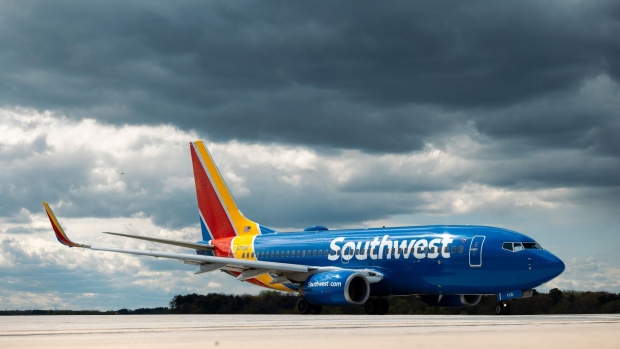Jun 26, 2024
Southwest Airlines Cuts Revenue Estimate on Complex Environment
, Bloomberg News

(Bloomberg) -- Southwest Airlines Co. reduced its estimate for unit revenue in the second quarter, a sign of ongoing challenges at the carrier as it fends off an activist push for a management overhaul.
The company expects revenue per available seat mile to fall as much as 4.5% in the current quarter, Southwest said Wednesday in a regulatory filing. It had previously expected a decline of no more than 3.5%.
Southwest attributed the pared outlook to “complexities in adapting its revenue management to current booking patterns,” according to the filing.
The reduction is an unwelcome development for Southwest Chief Executive Officer Bob Jordan as he faces demands for new leadership by some investors including activist Elliott Investment Management, which disclosed a $1.9 billion stake in Southwest earlier this month.
Elliott issued a statement Wednesday blasting Southwest for the cut, calling it the eighth guidance reduction in the past 18 months. The investor reiterated its demand for new leadership after the current team has “proven unable to adapt to the modern airline industry.”
Southwest said it still expects to post record operating revenue in the current quarter, despite headwinds as it makes changes to adapt its revenue management system to booking patterns.
“We are confident that Southwest Airlines has the right strategy, the right plan and the right team in place to drive long-term value for our shareholders,” the carrier said in a statement.
Southwest’s shares fell less than 1% in New York on Wednesday, paring an earlier decline of as much as 4.5%.
“Any way you dice it, Southwest continues to struggle in the current environment with more moderate leisure demand after years of strength,” Melius Research analyst Conor Cunningham said in a client note.
Despite demand at record levels, domestic travel growth in the US is slowing after a rapid rebound following the pandemic. Carriers have responded by dialing back plans to increase flying while also offering discounts to lure customers, putting a ceiling on higher fares.
The carrier had already begun rethinking long-held aspects of its business model, such as potentially abandoning unassigned seating and offering more premium options to adapt to the demands of today’s customers.
(Updates with Southwest comment in sixth paragraph.)
©2024 Bloomberg L.P.


